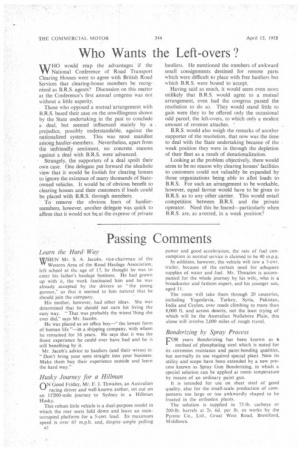Who Wants the Left-overs ?
Page 36

If you've noticed an error in this article please click here to report it so we can fix it.
WHO would reap the advantages if the National Conference of Road Transport Clearing Houses were to agree with British Road Services that clearing-house members be recognized as B.R.S. agents? Discussion on this matter at the Conference's first annual congress was not without a little asperity.
Those who opposed a mutual arrangement with B.R.S. based their case on the unwillingness shown by the State undertaking in the past to conclude a deal, but seemed influenced mainly by a prejudice, possibly understandable, against the nationalized system. This was most manifest among haulier-members. Nevertheless, apart from the unfriendly sentiment, no concrete reasons against a deal with B.R.S. were advanced.
Strangely, the supporters of a deal spoilt their own case. One delegate put forward the idealistic view that it would be foolish for clearing houses to ignore the existence of many thousands of Stateowned vehicles. It would be of obvious benefit to clearing houses and their customers if loads could be placed with B.R.S. through members.
To remove the obvious fears of hauliermembers, however, another delegate was quick to affirm that it would not be, at the expense of private hauliers. He mentioned the numbers of awkward small consignments destined for remote parts which were difficult to place with free hauliers but which B.R.S. were bound to accept.
Having said as much, it would seem even more unlikely that B.R.S. would agree to a mutual arrangement, even had the congress passed the resolution to do so. They would stand little to gain were they to be offered only the occasional odd parcel, the left-overs, to which only a modest amount of revenue attaches. '
B.R.S. would also weigh the remarks of another supporter of the resolution, that now was the time to deal with the State undertaking because of the weak position they were in through the depletion of their fleet as a result of denationalization.
Looking at the problem objectively, there would seem to be no reason why clearing houses' facilities to customers could not valuably be expanded by those organizations being able to allot loads to B.R.S. For such an arrangement to be workable, however, equal favour would have to be given to B.R.S. as to any other carrier. This would entail competition between B.R.S. and the private operator. Need this be feared—particularly when B.R.S. are, as averred, in a weak position?




































































































